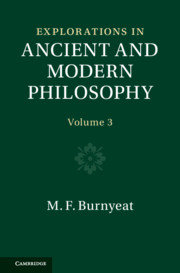Book contents
- Explorations in Ancient and Modern Philosophy
- Explorations in Ancient and Modern Philosophy
- Copyright page
- Contents
- Illustrations
- Preface
- Acknowledgements
- Abbreviations
- Introduction
- Part I The Republic
- Chapter 1 Plato on why mathematics is good for the soul
- Chapter 2 Long walk to wisdom
- Chapter 3 The truth of tripartition
- Chapter 4 Plato and the dairy-maids: the distribution of happiness inside and outside the ideal city of the Republic
- Chapter 5 Justice writ large and small in Republic IV
- Chapter 6 Fathers and sons in Plato’s Republic and Philebus
- Chapter 7 By the Dog
- Chapter 8 Culture and Society in Plato’s Republic
- Part II The past in the present
- Appendix: The archaeology of feeling
- Bibliography
- Index locorum
Chapter 4 - Plato and the dairy-maids: the distribution of happiness inside and outside the ideal city of the Republic
from Part I - The Republic
Published online by Cambridge University Press: 24 March 2022
- Explorations in Ancient and Modern Philosophy
- Explorations in Ancient and Modern Philosophy
- Copyright page
- Contents
- Illustrations
- Preface
- Acknowledgements
- Abbreviations
- Introduction
- Part I The Republic
- Chapter 1 Plato on why mathematics is good for the soul
- Chapter 2 Long walk to wisdom
- Chapter 3 The truth of tripartition
- Chapter 4 Plato and the dairy-maids: the distribution of happiness inside and outside the ideal city of the Republic
- Chapter 5 Justice writ large and small in Republic IV
- Chapter 6 Fathers and sons in Plato’s Republic and Philebus
- Chapter 7 By the Dog
- Chapter 8 Culture and Society in Plato’s Republic
- Part II The past in the present
- Appendix: The archaeology of feeling
- Bibliography
- Index locorum
Summary
Does Plato in the Republic restrict to philosophers alone the possibility of achieving happiness in this life and the next? It is often thought so. But if that were the case, the dialogue would fail on its own terms, in its task of persuading the interlocutors Glaucon and Adeimantus that they should cultivate justice, not (as Thrasymachus argues) injustice. They are not philosophers, nor envisaged as likely to achieve the level of rational understanding that is the precondition of happiness. In truth, however, there is plentiful, if scattered, evidence that an approximation to perfect happiness is available for various categories of people figuring in the Republic who have not attained what the dialogue counts as knowledge, ranging from Socrates himself, to trainee philosophers and warriors, to farmers and craftsmen. The requirement to be satisfied is the habit of respect for the law, not from fear of its punitive powers, but internalised as the way to lead a life of justice.
- Type
- Chapter
- Information
- Explorations in Ancient and Modern Philosophy , pp. 96 - 118Publisher: Cambridge University PressPrint publication year: 2022

